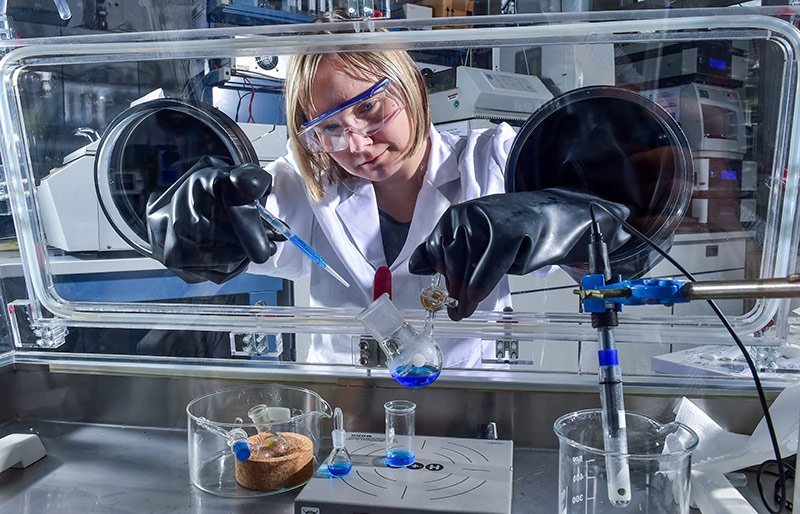Keeping an Eye on Environmental Protection and Costs
The TU Chemnitz is involved in the joint project “New galvotechnical coating processes from ionic liquids (GALACTIF)”, funded by the federal government with four million euros
-

Dr. Doreen Wachner, research associate of the chair of Materials and Surface Engineering at the TU Chemnitz and project manager, experiments with ionic liquids in a hermetically sealed Glovebox. Photo: Wolfgang Schmidt
Numerous components used in electronic engineering, transportation, chemical industry or medical science can be manufactured from inexpensive and widely available resources, when functionalized with a suitable metal coating. Those surfaces are commonly refined by electroplating. The reason: the process is particularly suitable for mass productions, as it allows a resource and energy efficient deposition of metals. Surface finishing ensures protection from corrosion or enhances properties such as abrasion resistance, scratch resistance, hardness or electrical conductivity. But for many applications using special metals, other coating processes are currently in use that are often more expensive and less environmental friendly.
An innovative and promising approach in the galvanic research is the coating with special metals such as niobium, tantalum, titanium, tungsten and molybdenum, using ionic liquids instead of conventional solvents. Ionic liquids are organic salts that are fluid below temperatures of 100°C. Their advantages are in the low steam pressure, low toxicity, non-flammability and a broad electrochemical window. The latter allows the deposition of those metals, that were either not accessible or only without the preferred properties from aqueous electrolytes. The scientific bases are still to be explored for the separation of technically usable surfaces made from ionic liquids.
This is where the new joint project “New galvotechnical coating processes from ionic liquids (GALACTIF)” of the BMBF funding program “Innovative Elektrochemie mit neuen Materialien – InnoEMat” positions itself. Associates are the Technische Universität Chemnitz, the Technische Universität Clausthal, the Technische Universität Ilmenau, the Fraunhofer Institute for Surface Engineering and Thin Films in Braunschweig, the Forschungsinstitut Edelmetalle und Metallchemie in Schwäbisch-Gmünd, as well as the Technische Universität München that also coordinates the whole project. “In the course of the project the electrochemical deposition of the chosen metal and alloy layers from ionic liquids is to be investigated that was not possible in the industrially applied aqueous systems so far,” Prof. Dr. Thomas Lampke, chair holder of the Department of Materials and Surface Engineering at the TU Chemnitz, illustrates and adds “As those electrochemical processes fundamentally differ from the nowadays used aqueous systems in regard to their physical properties, process mechanisms and structure of the interface, completely new concepts have to be developed to sufficiently understand those processes and to create the bases for a cost-effective, environmental friendly coating technology.”
The cooperation partners are convinced that in medium- and long-term the successful implementation of the research project will lead to great innovations in the mid-market characterized electroplating industry in Germany: “New processes will make a resource efficient manufacturing of durable components possible and environmental unfriendly processes will be defused or even substituted,” Prof. Lampke says. In his chair of Materials and Surface Engineering the priorities are set on the development of electrolytes with the help of physicochemical models. “Within the next three years we will investigate the binding conditions in ionic solutions as well as the electrochemical disposition of tungsten and molybdenum alloys,” Dr. Ingolf Scharf, project manager, explains. The researcher in Chemnitz benefit from a novelty regarding flexibility and effectivity of electroplating processes and their investigation with a fully automatic system of their own technical development. The project is funded by the federal ministry of Education and Research with approximately four million euros of which 640.000 euros are going to the TU Chemnitz.
Further information are available from Prof. Dr. Thomas Lampke, phone +49 371 531-36163, e-mail thomas.lampke@mb.tu-chemnitz.de
(Translation: Alissa Hölzel)
Mario Steinebach
02.12.2016




